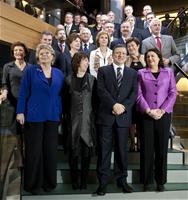Meglena Kuneva: business and consumers are not foes
euinside, February 11, 2010
 On the 9th of February the European Parliament has approved with a large majority the second Commission of president Jose Manuel Durao Barroso. And if for the most countries in the EU the change of members of the Commission is for a long time a regular process, for Bulgaria this was a test, which unfortunately could not spare the bitter pill. Our country has for a second time a representative in the executive body of the Union and this is Christalina Gheorghieva who is responsible for International cooperation, Humanitarian aid and Crisis response. During the hearings of the candidates in the European Parliament in January euinside sent written questions to the first Bulgarian commissioner Ms Meglena Kuneva.
On the 9th of February the European Parliament has approved with a large majority the second Commission of president Jose Manuel Durao Barroso. And if for the most countries in the EU the change of members of the Commission is for a long time a regular process, for Bulgaria this was a test, which unfortunately could not spare the bitter pill. Our country has for a second time a representative in the executive body of the Union and this is Christalina Gheorghieva who is responsible for International cooperation, Humanitarian aid and Crisis response. During the hearings of the candidates in the European Parliament in January euinside sent written questions to the first Bulgarian commissioner Ms Meglena Kuneva.
Her replies which we received, fortunately, in spite of her tough agenda, arrived just in time - in the day the new Commission was approved. These replies deserve being read because they are part of the experience Bulgaria will continue to gain during its not quite easy EU membership. From these replies we can see that the main part of the success of a commissioner are his or her personal and professional qualities. And also that creating a common European policy is a tough process which we should cherish very much if we want the EU to become a real competitive economy in a world, going through almost tectonic geo-political shifts.
euinside: I would like to make this interview something like a little summary of your term as a commissioner, so I will start with the question did you manage to turn the consumer protection policy in a major one in the EU?
MEGLENA KUNEVA: For the last 3 years I dare say that the consumer policy "grew up". In  the beginning there were comments that this was not a very promising portfolio but the time showed that the decision of the president of the European Commission to put consumers in the centre of the new economic order was right - today each economic policy is being considered through the prism of its effect on the consumer. The consumer policy is boundless, it has everything in it - economy, legislation, civil rights, protection of the environment, sustainable development. In a modern economy consumers are a leading force. I tried to convince the business and national authorities that they should listen to our voice and if they hear what we have to say, with joint efforts we can make the markets better functioning and more competitive.
the beginning there were comments that this was not a very promising portfolio but the time showed that the decision of the president of the European Commission to put consumers in the centre of the new economic order was right - today each economic policy is being considered through the prism of its effect on the consumer. The consumer policy is boundless, it has everything in it - economy, legislation, civil rights, protection of the environment, sustainable development. In a modern economy consumers are a leading force. I tried to convince the business and national authorities that they should listen to our voice and if they hear what we have to say, with joint efforts we can make the markets better functioning and more competitive.
euinside: What were the major hurdles in your work?
MEGLENA KUNEVA: When I became the first commissioner in the beginning of 2007, responsible for consumers, the traditional perception was that business and consumers are foes. My deep conviction is that this is not right and I invested a lot of efforts to break this stereotype. I hope that I managed to put an end to the perception that each additional consumers' right is a bad news for the business. In fact, there is no better ally to the good business which respects the rules than the consumers' rights. The rules which ban frauds, the misleading advertisements, for example, wipe the rogues from the market away. Their absence actually helps the honest traders and producers to win their clients with lower prices and more attractive services.
euinside: What is the one thing you can describe as a major success of your during your term?
MEGLENA KUNEVA: As one of my successes as a commissioner I would point out the new policy which I developed in the field of challenges in the digital world. For the first time in the history of mankind Internet is giving us an opportunity to compare prices of goods and services, offered by traders all around the world without us leaving our homes. To put it differently - the computer screen is the new market square. We invested a lot of efforts to identify and overcome the obstacles in the e-commerce so that each one of us, especially in times of economic crisis, to benefit as much as possible from the most lucrative and qualitative offers.
To a large extent I focused my attention on the field of services. In modern economy the services sector generates more than 80% of the GDP. In the same time we realised that consumers meet with more and more problems in this field than the traditional trade with goods. We undertook a number of concrete initiatives which have direct impact on our daily lives. After 7 years of negotiations the Consumers' Credit Directive has been endorsed, we also took measures against the unclear banking fees and we offered a single European form of the invoices for electricity supply.
For the first time during my term we made joint coordinated checks with national authorities in EU member states so as to see how the consumer protection legislation is being applied. And from the very first check - the web sites for airline tickets sales - this lead to removal of incorrect practices in over 50% of the web pages that were checked. Another major priority was to improve cooperation with our key partners like China and the US with regard to the quality of toys.
euinside: What have you not managed with and why?
MEGLENA KUNEVA: In my area of expertise I think I managed to find the most precise way of doing politics and this is that consumer protection in a larger extent is gaining the visibility it deserves. Of course, there is still a lot to do until consumers starts enjoying protection equally in every corner of the EU. I presented my vision of the future of consumer policy in November last year and I hope that the new European Commission will take into account the ideas, laid out in it.
euinside: The hearings in the European parliament are an extremely serious test for each candidate for a commissioner. Do you think that commissioners should also report to the MEPs for what their achievements are in the end of their mandate?
MEGLENA KUNEVA: The hearing at the European Parliament is a very important event for each commissioner. But it only marks the beginning of the relations with the most democratic European institution. The constant contact with the members of the Parliament is very important for the work of each commissioner because this is one of the ways the policy I carry out to reach the citizens. All the time during my mandate I had regular meetings with the members of the Internal Market Committee and the Committee for Consumer Protection. Together with the chairman of the latter committee we had joint initiatives. During the monthly sessions of the Parliament in Strasbourg I had the opportunity to exchange opinions and views with all MEPS who were interested in consumers' policy.
For me accountancy, the valuation of what's being done is of great significance. There is an accountancy mechanism in the Parliament and for all citizens of the EU. In the end of his mandate each commissioner is preparing a report of his/hers activities which is then sent to the members of the European Parliament and to other interested sides, like non-governmental organisations, companies, business associations, etc. The document is also on the web page of the European Commission and can be seen by everyone who is interested. I am glad that I had the opportunity to present my report to the Bulgarian audience in November last year. Aside from the already mentioned reports of all commissioners, there was a general report of the European Commission as a whole where most of the achievements of the team of the Commission president Mr Barroso for the last 5 years are also described.
euinside: During the hearing in the European Parliament of your successor John Dalli, the members of the Environment, Health and Food Safety Committees explained that they worked extremely well with you and wished him the same. What would you advise him to do? Is there something on which he should focus his efforts?
MEGLENA KUNEVA: I would not allow myself to give any pieces of advice but I would wish Mr Dalli to keep the place of the consumers in the centre of the process of doing economic policy.
euinside: Do you think that it was a good idea healthcare and consumer's protection to be merged a single portfolio?
MEGLENA KUNEVA: This co-existence of the healthcare policy and the consumers is not new. It was the same before 2007. But it is important for me to note that in the next European Commission (already approved) 3 commissioners will be responsible for consumers. This policy proved to be interesting and attractive for many of my colleagues because it is a rich land and the concrete results are visible in our daily lives. Mainly Mr Dalli will deal with consumers' protection. The legislation int he field of consumers' legislation will be considered by Ms Vivianne Reding in the framework of the civil rights. And the president of the Commission Barroso has created a new portfolio which aims at removing the obstacles for the free trade in the Internet and my colleague Ms Neelie Croes will have the opportunity to continue the work I have started. As you can see I leave my portfolio in good hands.
euinside: During your work as a commissioner you used to visit Bulgaria very often - to give start to different campaigns, you have also created a consumers' school. What results have you managed to achieve?
MEGLENA KUNEVA: The Bulgarian consumer to a large extent is well aware with his rights in some field like products' safety and the contracts between traders and consumers for goods, but they want and should know more. More and more people are aware what a defective goods is, how to replace it, how many months is the guarantee. But this is not enough nowadays. The evolution of the Internet and the e-commerce gives us the opportunity to to buy different goods and services from every part of the world and we have to be aware of much more complex rights. In today's world strong is that consumer who knows.
The insufficient level of information of citizens about their rights as consumers is a big problem in most of the new member states, including Bulgaria. In this regard, we as a society have a lot more to do. Not only the state but the business should spend money for training of consumers. In January this year a broad information campaign started, supported by the European Commission. I can confidently say that for the last 3 years we, the Bulgarians, have become more informed but we can always learn something new.
euinside: Would you agree with the position that the hardest is the battle for protection of consumers from the big companies, the monopolists?
MEGLENA KUNEVA: It is interesting that you used the word "battle". It suggests confrontation but as I mentioned earlier business and consumers are not enemies. In fact, on monopolistic markets consumers face more problems than on markets where there is competition. The first edition of the Consumers Markets Index showed that one of the most problematic sectors in all member states is the energy market and in many of the cases these markets are still monopolistic. I am a supporter of solving problems through dialogue and this is indeed the method I used in this case.
 Together with commissioner Piebalgs, who is responsible for energy (was until 9th of February, the new energy Commissioner is Guenter Oettinger), we have created a Civil Energy Forum. This forum for the first time gathered together representatives of the national authorities, energy regulators, the business and consumers' organisation. It was extremely difficult to gather together all interested sides but the initiative attracted a lot of interest and will continue in the future. During the second edition of the Forum the main issue was the common European form for energy bill. And During the next edition the participants will discuss how consumers' complaints should be processed and how to react at them.
Together with commissioner Piebalgs, who is responsible for energy (was until 9th of February, the new energy Commissioner is Guenter Oettinger), we have created a Civil Energy Forum. This forum for the first time gathered together representatives of the national authorities, energy regulators, the business and consumers' organisation. It was extremely difficult to gather together all interested sides but the initiative attracted a lot of interest and will continue in the future. During the second edition of the Forum the main issue was the common European form for energy bill. And During the next edition the participants will discuss how consumers' complaints should be processed and how to react at them.
euinside: We saw that China and its cheap goods are a serious threat for the consumers and their health. Are there still in Europe European companies which also threaten the health and the interests of consumers with their goods and/or their services?
MEGLENA KUNEVA: I have said many times that safety of goods is the area where I will never make a compromise because safety is not a luxury. The main responsibility for safe products on the market is of the producers and the dealers. Fortunately the business is more and more active in ensuring that it provides its clients only safe products. Last year the new business application for RAPEX started which allows each company, if it finds faults with a product to inform immediately the European Commission and all member states where the product is being sold.
The application is becoming more and more popular and is being used by large companies like the producer of baby strollers Maclaren which recently had a problem with some of its models and was forced to organise an information campaign and to distribute additional veils for the strollers. Thanks to using the business application, the information about the withdrawal from the market reached quickly the authorities in all member states and further incidents were prevented.
euinside: If you have to place the position of consumers in member states' priorities after 3 years of consumer policy, where would you put them? Lower than the interests of the business or higher?
MEGLENA KUNEVA: The level of commitment towards the consumer policy is different in all member states. In some there is a very well developed consumer culture, there are strong consumer organisations, high commitment by the governments. Different governments demonstrate different readiness to invest efforts in such a policy - to survey the market, to solve conflicts, to support non-governmental organisations etc. What I can assure you is that every such investment pays back many times because it will shorten the distance between administration and people and will make the market better functioning.
euinside: And in Bulgaria?
MEGLENA KUNEVA: On a legislative level the situation with consumers' protection is good - most European directives have been introduced in the Bulgarian legislation and there are no procedures for non-implementation, started by the Consumers' Protection Committee. I had 2 meetings with the minister of the economy Traykov and I hope that consumers' policy in Bulgaria will gain more attention. The state has an important role in the development of civil society and in helping consumers' organisations. I am glad that after a serious preparation, aside from the information campaign I've already mentioned, the European Commission will finance the advertising campaign of the Bulgarian consumers' organisation "Active Consumers".